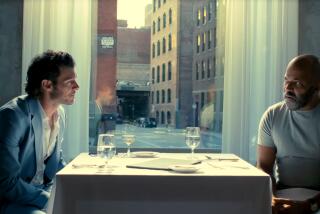Impeccably crafted ‘No Man of God’ seeks the truth behind Ted Bundy
- Share via
The Ted Bundy story has already been oft picked over, from the books of Ann Rule to the recent Netflix film “Extremely Wicked, Shockingly Evil and Vile,” starring former teen heartthrob Zac Efron as the notorious serial murderer. What more can be said about him? It seems we still need to understand why he did what he did, which is the central question of the new film “No Man of God,” directed by Amber Sealey, written by Kit Lesser, which explores the relationship between Bundy and FBI agent Bill Hagmaier, who forged a strange kind of friendship in the last years of Bundy’s life.
“No Man of God” is not a biopic of either Bundy (Luke Kirby) or Hagmaier (Elijah Wood). Rather, it is a portrait of their short but significant connection, hashed out in an interview room in Florida State Prison from 1985 to 1989. Hagmaier was a rookie agent at the newly formed National Center for Analysis of Violent Crime who volunteered to interview Bundy in prison in hopes of understanding his motivations for committing the rapes and murders for which he’d been convicted and sentenced to death. The goal was to use Bundy to further develop knowledge of serial killers and potentially even close a few cases.
“No Man of God” is not unlike a special episode of David Fincher’s FBI profiling Netflix series “Mindhunter”: a young agent gets a little too close to a seductive psychopath in the search for answers that might serve a bigger cause. But there’s something almost soulful in the way that Wood’s Hagmaier transcends the danger of getting too close to someone like Bundy. He respects and trusts him as much as he condemns him, both figuratively and literally. He always tells the truth, which starkly contrasts with Bundy’s twisted, self-aggrandizing personal rhetoric.
There are a few themes that Bundy repeats again and again in “No Man of God”: that Hagmaier just wants to understand him, and it’s in this understanding, this seeing of Bundy as a person and not a monster, that they are able to find a sliver of room for friendship. He also repeatedly reminds Hagmaier that they could just as easily swap places in this life, a mantra that seems to be more of a comfort to Bundy than a statement of fact.
“No Man of God” is impeccably and carefully directed by Sealey, and the craft on display is remarkable. Karina Silva’s precisely off-kilter cinematography animates the claustrophobic room where Hagmaier and Bundy hold their conversations. Clarice Jensen’s unsettling electronic score commingles with the camera work to build a sense of achingly slow-burn tension. Abstract interstitial montages let off a bit of steam with a propulsive electro soundtrack, marking the passing of time with images of the menacing and the mundane. The film is beautifully acted by Wood and Kirby; Kirby is especially compelling in such a challenging role, equal parts cajoling, grandiose and terrifying. His Bundy is mystifying yet always humane.
However, there’s a nagging feeling that persists during “No Man of God” as one struggles to discern why this film exists or what it’s trying to say. While it explores this unique dynamic between these two men, a relationship that made Hagmaier a legend in criminal profiling, it doesn’t feel particularly illuminating about Bundy. What Hagmaier concludes is that Bundy committed these crimes because he wanted to, and that he should pay for his actions with his life. It’s almost frustrating that it doesn’t have more to impart than that, but perhaps that’s all there is.
Katie Walsh is a Tribune News Service film critic.
‘No Man of God’
Not rated
Running time: 1 hour 40 minutes
Playing: Stars Aug. 27, Laemmle Noho, North Hollywood; Alamo Drafthouse Downtown Los Angeles
More to Read
Only good movies
Get the Indie Focus newsletter, Mark Olsen's weekly guide to the world of cinema.
You may occasionally receive promotional content from the Los Angeles Times.







